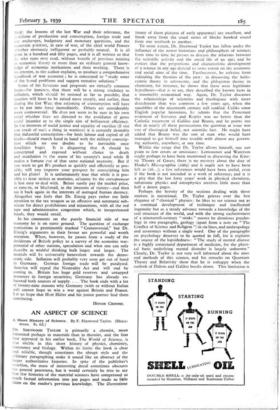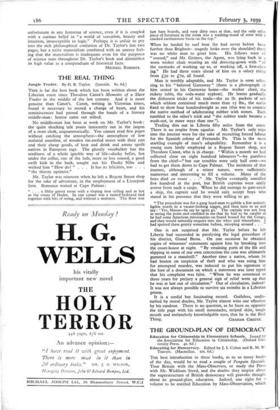AN ASPECT OF SCIENCE A Short History of Science. By
F. Sherwood Taylor. (Heine- mann. 8s. 6d.) DR. SHERWOOD TAYLOR is primarily a chemist, more interested perhaps in materials than in theories, and the bias that appeared in his earlier book, The World of Science, is a!so visible in this short history of physics, chemistry, astronomy and biology. Within its limits the book is dear and reliable, though sometimes the abrupt style and the arbitrary paragraphing make it sound like an abstract of the larger authoritative histories. In spite of the publisher's assertion, the mass of interesting detail sometimes obscures the general panorama, but it would certainly be true to say that few histories of the material sciences have compressed so much factual information into Soo pages and made so little claim on the reader's previous knowledge. The illustration.'
(many of them pictures of early apparatus) are excellent, and break away from the usual series of blocks hawked round from one textbook to another.
To some extent, Dr. Sherwood Taylor has fallen under the influence of the newer historians and philosophers of science; from time to time he pauses to discuss the relations between the scientific activity and the social life of an age; and he notices that the proportions and characteristic development of a science in any age depend to some extent on the economic and social aims of the time. Furthermore, he refrains from ridiculing the theories of the past : in discussing the helio- centric theory in astroncmy, and the phlogiston theory in chemistry, for instance, he shows that these were legitimate hypotheses—that is to say, they described the known facts in a reasonably economical way. Again, Dr. Taylor discusses the relationships of scientists and theologians with more detachment than was common a few years ago, when the squabbles of the nineteenth century still rankled. Unlike some English popular historians, he admits that the Protestant treatment of Servetus and Kepler was no better than the Catholic treatment of Galileo and Bruno, and he points out that in nearly all these persecutions the question at issue was one of theological belief, not scientific fact. He might have added that Bruno was the sort of man who would have managed to get himself into trouble with almost any govern- ing authority, anywhere, at any time.
Within the range that Dr. Taylor allows himself, one can point to few errors or omissions : Lomonosov and Waterson ought perhaps to have been mentioned in discussing the Kine- tic Theory of Gases; there is no mystery about the date of Hooke's Micrographia (1665) and it ought not to have been left as (D5 ..); a few references would have been useful, even if the book is not intended as a work of reference; and it is a pity that the last forty years' work in physical chemistry, subatomic physics and astrophysics receives little more than half a dozen pages.
Perhaps the brevity of the sections dealing with these matters is intentional. Dr. Taylor grieves over the lost elegance of " classical " physics : he likes to see science not as a continual development of technique and intellectual ingenuity but as a steady advance towards a knowledge of the real structure of the world, and with the strong exclusiveness of a nineteenth-century " stinks " master he dismisses psycho- logy in two paragraphs, geology (apart from a note on " The Conflict of Science and Religion ") in six lines, and anthropology and economics without a single word. One of the paragraphs on psychology deserves to be quoted in full, for it explains the source of the lopsidedness : "The study of mental disease is a highly conjectural department of medicine, for the physi- cal basis underlying mental disorder is largely unknown." Clearly, Dr. Taylor is not very well infonned about the aims and methods of this science, and his remarks on Quantum Theory and Relativity show that he is unhappy when the outlook of Dalton and Galileo breaks down. This limitation is unfortunate in any historian of science, even if it is coupled with a curious belief in " a world of sensation, beauty and intuition, insusceptible to logic." Perhaps it is unfair to pry into the rich philosophical confusion of Dr. Taylor's last two pages, but a naïve materialism combined with an uneasy feel- ing that the materialism is inadequate even for the purposes of science runs throughout Dr. Taylor's book and diminishes its high value as a compendium of historical facts.
MICHAEL ROBERTS.











































 Previous page
Previous page